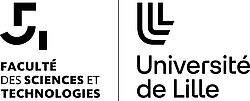la faculté des sciences et technologies
L'Université de Lille propose une nouvelle offre de formation à la rentrée 2026.
Elle s'est dotée d'un nouveau portail, plus intuitif et ergonomique, afin d'améliorer la lisibilité de l'offre de formation. L'ensemble de l'offre de formation sera progressivement mise à jour dans ce nouveau catalogue.
Retrouvez dès maintenant les licences, DEUST et BUT sur https://formation.univ-lille.fr/
Retrouvez nos licences et nos Deust ici !
Les licences professionnelles, masters et la formation continue sont toujours consultables ci-dessous.
Trouver une formation
MASTER CHIMIE PHYSIQUE ET ANALYTIQUE
Parcours Advanced spectroscopy in chemistry (M2)
Choisissez un autre parcours:
- Parcours Advanced spectroscopy in chemistry (M2)
- Parcours Chimie physique et analytique - M1 Tronc commun
- Durée: 2 semestre(s)
- Accessible en: Formation initiale , Formation continue
- Langue(s) d'enseignement: Anglais
- Stage: OBLIGATOIRE(S3),OBLIGATOIRE(S4)
- Niveau de diplôme requis à l'entrée: BAC+4
- Niveau de diplôme validé à la sortie: BAC+5
- N°RNCP: RNCP38709
- 20260107
Objectifs de la formation
OBJECTIVES
Created in 2007, the Erasmus Mundus Joint Master's Course in Advanced Spectroscopy in Chemistry - ASC Master - has been jointly designed and is operated by 5 European partner universities (Lille - coordinating institution; Alma Mater in Bologna, Jagiellonian in Krakow, Leipzig and Helsinki). The ASC master is a program of excellence which has been awarded the Erasmus Mundus label and funding twice since 2008.
It is a two year (4 semesters, 30 ECTS each) Master program including mobility periods within the ASC network. Each partner university of the ASC network offers state of the art equipment and expertise covering applications of spectroscopic techniques to chemistry in a broad sense (from material sciences, environmental sciences, biomedical/health sciences etc.). Mobility within this network prepares students to become experts and develop intercultural skills towards doctoral studies, and/or professional industrial careers in chemical analysis and characterization of the structure of materials in the fields of molecular synthesis, biology, nanotechnologies, modeling, pharmacy, green chemistry, materials, and sustainable energies.
Spécificités de la formation
STRENGTHS OF THE COURSE
- A guarantee of quality: the ASC master is an accredited master's degree in all 5 partner institutions;
- The ASC master is supported by the European Union (Erasmus Mundus Joint Master Degree) and has been awarded the Euromaster label by the ECTNA (European Chemistry Thematic Network Association);
- The ASC master has developped a network of global industrial partners, competitiveness clusters and research institutes ;
- The ASC master provides skills not only towards doctoral studies, but also towards professional activities in industry;
- Mobility within a network of research laboratories spread amongst 5 countries from a large area of Europe;
- A high level equipment available in the ASC network is unique;
- A high level supervision and training;
- Graduates are awarded a multiple degree from the partner institutions where they have spent at least one semester (30 ECTS credits;
- Erasmus Mundus student scholarships including a living allowance of 1 000 euros per month and covering participation, installation and travel costs.
Compétences visées
TARGETED SKILLS
ASC graduates
- Are experts in chemical analysis, structural characterization, characterization of fast reactions, In Situ spectroscopy, imaging;
- Are well prepared for RetD careers in industry or in public research institutes;
- Develop high skills in project management, intercultural communication, and are at least bilingual.
Modalités d'admission/ Conditions d'accès
EN MASTER 2
L’accès est de droit en master 2 pour les étudiant·e·s ayant validé le master 1 correspondant à l'université de Lille.
Les candidat·e·s issu·e·s d'une autre mention, d'un autre parcours de la mention ou d'un autre établissement d'enseignement supérieur doivent formuler une demande d'intégration selon les modalités suivantes :
La 2e année du Master n'est pas ouverte au recrutement. Seuls les étudiants ayant validé à l'Université de Lille le Master 1e année peuvent intégrer la 2e année.
Organisation de la formation
TRAINING'S ORGANIZATION
The ASC master is a 2-year master's course (120 ECTS credits).
- Three semesters (30 credits each) of integrated courses : the first semester provides all students with a common platform in advanced spectroscopic methods, including magnetic resonance, mass spectrometry, optical spectroscopy and diffraction techniques. In the second and third semesters, more specialized instruction is provided with applications in molecular synthesis, material sciences, biology, nanotechnologies, modeling, “green chemistry”, new energy sources. 10 credits are devoted to transferable skills (internship, bibliographical research, project management, norms and regulations in chemistry).
- One semester for the Master thesis (30 credits) in a research Laboratory The ASC network offers a broad range of opportunities for internships in research laboratories within the ASC institutions, and associated partners (industry, large scale research facilities or research institutions). The master thesis can be based on a collaborative project between two institutions.
- In addition, a winter school is organized each year in a different location on a chosen topic to deepen one specifi c fi eld of spectroscopy. This joint social event gathers students, members of the ASC institutions as well as industrial and research associated partners, and ASC alumni.
Over the years, the ASC network has developed links with global industrial partners producing spectrometers (Br�ker, Magnetech) as well as with regional competitiveness clusters (MATIKEM in Lille, NEU in Leipzig). A privileged partnership has also been established with great research facilities such as synchroton SOLEIL in France and ELETTRA in Italy.
Programme
Insertion professionnelle
JOB OPPORTUNITIES
Since it first opened, 222 students from 51 countries have enrolled the course. ASC graduates have acquired the ability to work in a multicultural environment and are at least bilingual. L'Oréal Paris, RetD, Paris and Shanghai, Merck KGaA – Milipore, Darmstadt, Germany, Reckitt Benckiser, Hull, UK, among others, chose to hire them, either directly after the Master or after a PhD.
Nearly 80% of the ASC graduates have started a PhD, mainly in European universities.
Faculte des Sciences et Technologies
Université de Lille I Campus Cité scientifique
1er étage - Bât. faculté des sciences et technologies
59655 Villeneuve-d'Ascq
https://sciences-technologies.univ-lille.fr/
FST - Departement Chimie
Université de Lille I Campus Cité scientifique
